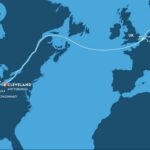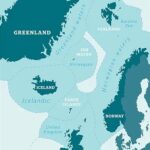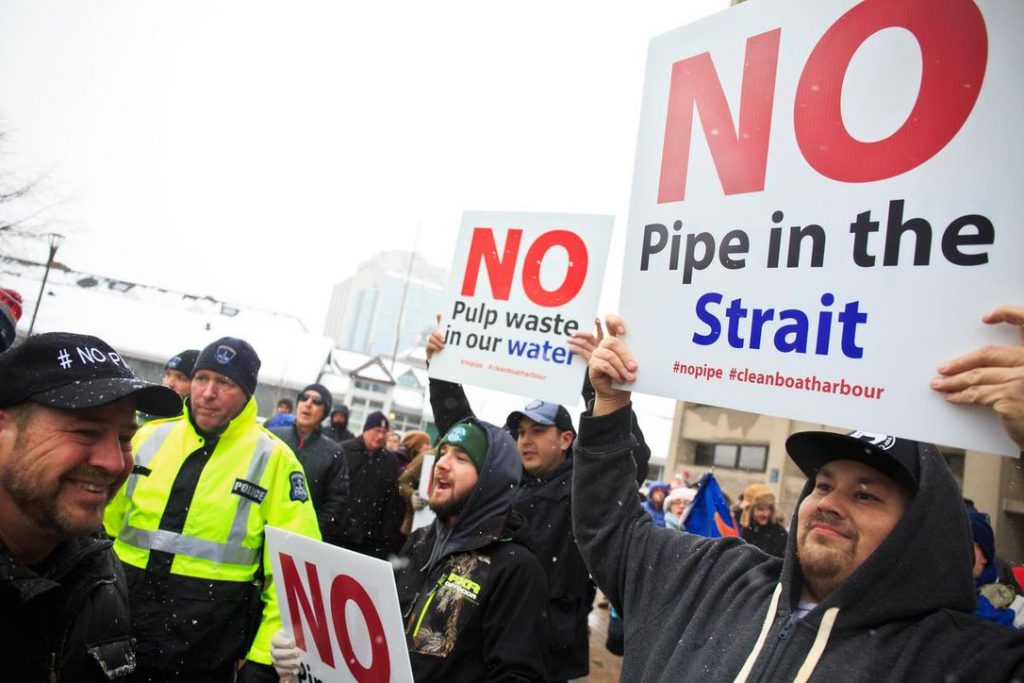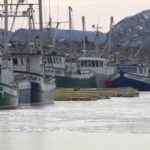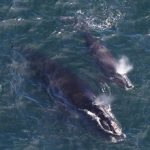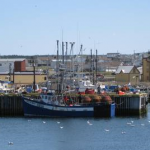Misguided AB 534 ‘Pop-Up Crab Gear’ Will Hurt Whales, Fishing Families, Coastal Communities
For Immediate Release March 30, 2021
Misguided AB 534 ‘Pop-Up Crab Gear’ Will Hurt Whales, Fishing Families, Coastal Communities
Data Show Whale Populations Soaring, Virtually No Interactions with Crab Gear Crescent City, CA – Recently, Assembly Member Bonta of the California Legislature introduced a bill – AB 534 – that, if passed, would require faulty and failure prone ropeless fishing gear, as determined by the California Department of Fish and Wildlife (CDFW), to be used when taking any species of fish for commercial or recreational purposes when using a trap.
That’s why a large, diverse coalition of fishery groups have mobilized in recent weeks to oppose AB 534. A letter signed by all the major fishing and seafood processing trade associations has been sent to Assembly Member Bonta and the Water and Parks Committee members who will vote on the legislation. A petition opposing the bill is being circulated widely on social media fishing pages and already has over 4,000 signatures.
AB 534 promotes an unproven and unviable fishing method that presents significant operational and safety risks to West Coast fisheries and that will result in more harm to marine life. The bill is an end-run around existing state and federal regulatory processes that are already addressing fishery interactions with humpback whales,” said Ben Platt, President of the California Coast Crab Association (CCCA).
“The commercial crab industry has worked tirelessly for more than a decade to mitigate interactions between our fishery and Endangered Species Act (ESA) listed animals, including Humpback whales, Blue whales, and Leatherback turtles. These measures have reduced marine mammal interactions with fishing gear to practically zero,” continued Platt. “While the optics of extremely rare interactions with existing crab gear are upsetting, the real danger to a robust and rapidly growing whale population is the so-called ‘ropeless’ gear being proposed by AB 534.That’s because as much as 20
percent of this gear is lost or irretrievable, which litters the ocean and greatly increases, NOT decreases, the risk of entanglement for whales and turtles.”
The proposed bill is more restrictive than even the most protective marine mammal laws in the nation, the Marine Mammal Protection Act (MMPA) and the ESA. It would require the state to unnecessarily regulate commercial fishing, taking an end run around the regulatory process by mandating through statute an unworkable new technology which has zero support in the fisheries.
Humpback whales, the only ESA-listed marine mammal which has any potential co-occurrence with the crab fishery, are a robust and thriving population. The only significant non-naturally occurring mortality to whales off the CA coast is caused by large ship strikes. These cruise and cargo ships kill between 50-150 whales a year, yet the Humpback whale population is still expanding at a rate of 8-10 percent annually, according to the Cascadia Research Collective (CRC). That means 575 new animals will be added to the population just this year.
“When the Center for Biological Diversity first sued CDFW in 2018 over the interaction issue, there were thought to be 2,200 Humpback whales, but recent official revisions to the population count shows more than 7,200 migrating off the West Coast,” said Platt.
“The California Dungeness crab fishery has had zero confirmed interactions with Humpbacks in the current 2021 season, and only one confirmed interaction with a whale during the 2020 season, and that whale was released unharmed. Our fishery has zero impact on the species, and in fact, we are hopeful Humpbacks will soon be removed from the Endangered Species List.
“This is a huge success story, and in light of it, AB 534 constitutes a solution in the absence of any problem,” continued Platt. “And because the crab fishery is our most widely shared and economically important fishery, the new bill threatens the continuation of the entire West Coast commercial fishing industry. Most fishermen and seafood buyers will not be able to stay in business without a viable crab season. The long-term effects on the rural coastal communities of California, which rely heavily on the crab industry, will be devastating.”
“I’ve been buying and selling live crabs for more than a decade, including year-round delivery to many Asian restaurants and seafood markets in Assembly Member Bonta’s own district, and I can tell you his bill will make it extremely challenging for all of us to survive economically,” said George Lay, owner of Ocean King Fish. “The Asian community is all about traditions, especially live Dungeness crab; it’s at every family gathering. AB 534 will price live crab out of reach for a lot of families, essentially killing this tradition and many businesses in the process.”
Further, the cost for the three ropeless gear types being most aggressively pushed range between $720 and $2,500 per device. This means that a permit owner with a 500-trap tier allotment must spend between $360,000 and $1,255,000 to switch from the existing gear to “pop-up” gear. By comparison, a 500-trap allotment today, including all traps, lines, buoys, and bait jars, will cost between $80,000 and $125,000.
“Even the most successful crab boat owners will not be able to afford to switch to ‘pop- up’ traps,” said Pratt. “This is a total non-starter for this fishery, and crabbers are not interested in wasting time and money on a gear type that won’t work and will bankrupt them.”
For further evidence that AB 534 is unneeded – and indeed dangerous – the successful rules and practices developed over the past decade were in partnership with Director Bonham and the CDFW, Chairman Crowfoot and the Ocean Protection Council, Senator Mike McGuire and his Joint Committee in Fisheries and Aquaculture, and stakeholder groups including the Dungeness Crab Task Force, the Whale Working Group, the California Coast Crab Association and other stakeholders.
These measures include strict trap limits which "cap" the number of traps which can be deployed in the fishery; a Whale Working Group to assess risk and recommend in- season management measures to avoid interactions with the fishery; an enforceable Safe Practice Guideline for crab gear; a coastwide, enforceable Lost Gear Retrieval Program; and, most recently, a CCCA boat-based whale surveying pilot project to help reduce cost and manpower burden on CDFW, while increasing coverage of critical marine life concentration reporting to avoid co-occurrence with the fishery.
“Unfortunately, California regulators so far have not been willing to change the regulations to reflect the higher whale population numbers or push back seriously against the NGO attacks on our coastal fishing communities. The only gear type they have seriously considered is ‘pop-up’ gear, which has proven to be extremely cost prohibitive, impractical, and ineffective, and results in more risk to marine mammals, not less,” said Platt.
“There is already an existing process underway under Section 10 of the ESA to implement a Conservation Plan to protect ESA-listed species along California’s coast. That plan will also comply with the MMPA. The ESA and the MMPA are the ‘gold standard’ for the protection of marine mammals. It is not helpful—and not protective for marine mammals—for the state to have to deal with unnecessary and ill-advised distractions from completing those federal processes,” said Ryan Steen, attorney with Stoel Rives LLP who represents CCCA and specializes in the ESA and MMPA.
About the California Coast Crab Association
The CCCA is a non-profit 501(c)(6) trade organization composed of individual crab boat owners, hired captains and Dungeness crab buyers. The CCCA board of directors is made up of nine member fishermen and crab buyers with a combined 240 years of experience in the crab fishery. Our diverse membership includes the smallest operators with skiffs up to the largest crab boats on the West Coast, and our member-buyers range from small live crab peddlers to the largest distributor of seafood on the West Coast.
The CCCA was formed in May of 2019 after the disastrous out-of-court settlement agreement in CBD vs Bonham, which created new, highly restrictive, and unfair restrictions for the California Dungeness crab fishery. Dungeness crab is the most widely shared and economically important fishery to the West Coast commercial fishing industry, but the new ESA mandates created by CBD vs Bonham are threatening the viability of the fishery and the economic health of California's coastal communities.
Since formation, the CCCA has been working hard with the crab fishing industry and the CDFW to find workable solutions to meet the mutually shared goals of protecting our most valuable fishery and minimizing interaction between marine mammals and our
fishing gear. In recent years, the commercial fishing fleet has been proactive in addressing important issues by initiating legislation through our Dungeness Crab Task Force to create new rules, including tiered trap limits, a Whale Entanglement Working Group, a statewide Lost Gear Retrieval Program and Safe Practice Guidelines for fishermen. More information at www.cacoastcrabassociation.org.
Media Contacts:
Ray Young
Razor Sharp PR
916-505-4245
ray@razorsharppr.com
Ben Platt
President, CCCA
707-367-0385
kaybeefish@yahoo.com



































